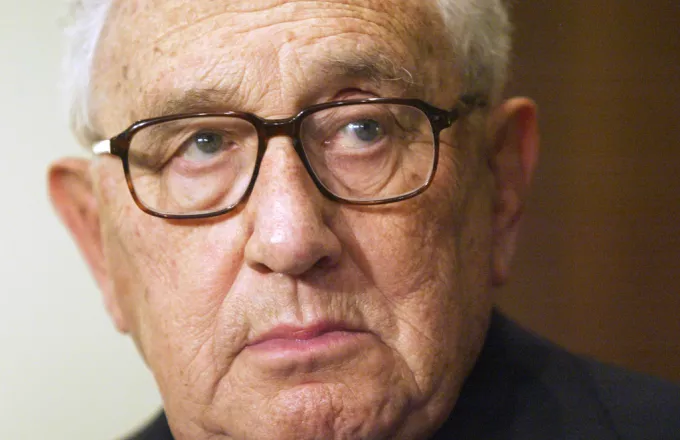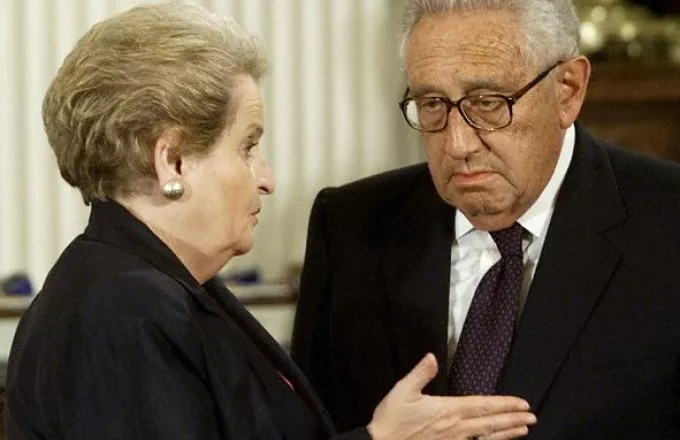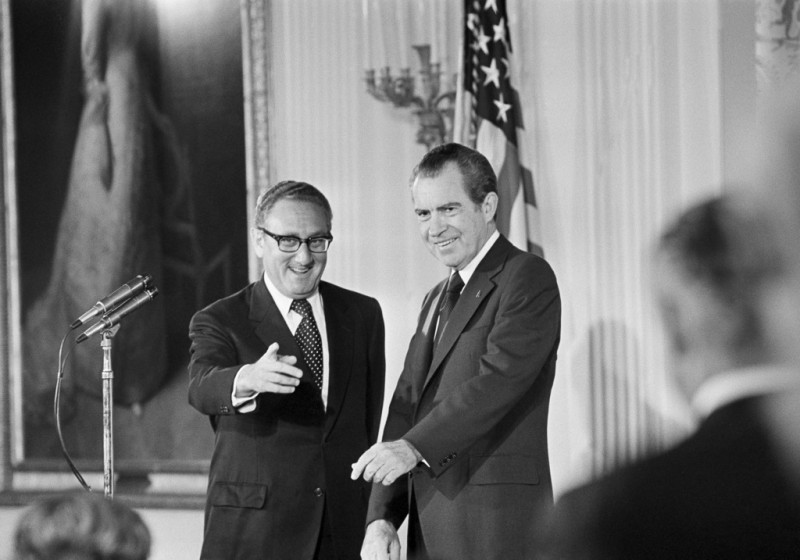Kissinger was credited with rapprochement with Moscow and Beijing, but his image was tarnished by his involvement in tragic events, above all the coup of September 11, 1973 in Chile.
“Power is the ultimate aphrodisiac”
Henry Kissinger
The end of an era, not only for the United States, but also for international diplomacy, is marked by the death of Henry Kissinger, founder of the so-called realistic (Realpolitik), according to others cynical, US foreign policy. Kissinger, for some a “wizard of diplomacy” and for others a “modern Machiavelli”, however the man many Greeks loved to hate, died at the age of 100 on Thursday morning at his home in Connecticut.
Until the end of his life he continued to do what he does best: to be a shaper of international developments, even if indirectly, with his presence on the international scene, decades after he left the post of US Secretary of State.
No exaggeration Kissinger changed the world even though it never happened “planetary”. He credited the rapprochement with Moscow and with Beijing, however his image was tarnished due to his involvement in tragic events, above all the coup of September 11, 1973 in Chile.
An indication of the aura and influence of the short man with the thick glasses, bass voice and distinctive German tinge to his English accent: despite his advanced age, he was often consulted by much of the US political elite, and not only while not infrequently he was welcomed abroad by heads of state.
In his last major trip, he visited Beijing in July to meet with the Chinese president Xi Jinping. The latter praised him “legendary diplomat” who was instrumental in the rapprochement between China and the US in the 1970s.
versatile, Kissinger is one of the best known proponents of the school of realism in international relations (realpolitik), which argues that the foreign policy of a state must be drawn up with the sole aim of national interest, ignoring factors such as the moral-philosophical beliefs of the respective government or human rights. So, has come under intense criticism from the left for his support of dictatorial regimes as long as they serve US interestsbut also by neoconservatives, whose efforts for “human rights” and “global spread of democracy” Kissinger treats as dangerous naiveties that show ignorance of how the world works.
Henry Alfred Kissinger (English: Henry Alfred Kissinger, May 27, 1923 – November 29, 2023), served as the 56th Secretary of State of the United States, from 1973 to 1977 under Presidents Richard Nixon (1973-1974) and Gerald Ford (1974 -1977). Also, from 1969 to 1975, he served as the United States National Security Advisor under the Nixon presidency and the Ford presidency. He was a member of the Republican Party.
Furthermore, in 2002, he served as chairman of the September 11, 2001 Commission (“9/11 Commission”), in order to fully investigate the terrorist attacks of September 11, 2001 in the United States.
Kissinger is considered both one of the most important figures in international politics and diplomacy in the 20th and 21st centuries, as well as one of the most controversial. According to many scholars of International Relations, his tenure as Minister of Foreign Affairs was highly effective and successful. In 1973, he received a controversial Nobel Peace Prize for his actions in bringing about a ceasefire in the Vietnam War.
THE Kissinger was born in Germany as Heinz Alfred Kissinger (Heinz Alfred Kissinger) to German Jewish parents. His father Louis Kissinger (eng. Louis Kissinger, 1887-1982) was a teacher and his mother Paula (Stern) Kissinger (1901-1998) a housewife. At a young age, his favorite pastime was football and he was even a player in the youth section of the “Groeter Firth” football team, one of the best teams in Germany at the time. Together with his parents, in 1938 they escaped to the USA, to New York under the threat of the Nazi regime. There he attended George Washington High School, where after his freshman year he attended night classes while working in a factory during the day. He then studied accounting at the City College of New York while continuing to work.
In 1943 his studies were interrupted when he was called to serve in the American Army. During the following period he participated in World War II operations, including a mission to Krefeld and Hanover, Germany. After the war he continued his studies at master’s and doctoral level. He received a PhD in Political Science from Harvard in 1954: his thesis was entitled “A World Restored: Metternich, Castlereagh and the Problems of Peace 1812-1822”. The topic of his thesis – the conferences and congresses that led to the design and establishment of the new international system after the defeat of Napoleon – made a big impression because at that time (the height of the Cold War) almost all American political scientists were dealing with issues such as communism, nuclear weapons, guerilla warfare techniques, etc.
In 1957, with the publication of the book “Nuclear Weapons and Foreign Policy”, he first became known as a reliable commentator on international relations. He pursued an academic career at Harvard, but at the same time participated in various government agencies and committees related to the foreign policy and security of the United States.
After 1969, Kissinger was responsible for the “opening” of US diplomatic relations with Mao Zedong’s Communist China and the détente of Cold War rhetoric and tension with Leonid Brezhnev’s Soviet Union. As a result of his contacts with Chinese Premier Chu Enlai, a unified US-Chinese anti-Soviet strategy was agreed upon within the framework of common state interests. Kissinger argued that this agreement is proof of the primacy of interests over ideology in international policy-making. And for his contribution to the ceasefire and the US withdrawal from Vietnam, he was awarded the 1973 Nobel Peace Prize – although the ceasefire ultimately did not last. At the same time, however, under his guidance the American government decisively supported various authoritarian regimes, including the Greek Junta of the Colonels and General Augusto Pinochet’s junta in Chile.
skai.gr – wikipedia.gr – AMPE
Source :Skai
With a wealth of experience honed over 4+ years in journalism, I bring a seasoned voice to the world of news. Currently, I work as a freelance writer and editor, always seeking new opportunities to tell compelling stories in the field of world news.














